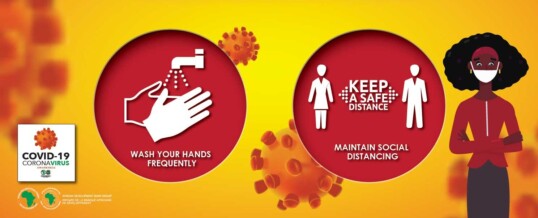
McLeod Group blog by Stéphanie Bacher and Kirsten Van Houten, April 20, 2020
The COVID-19 virus has now reached Africa, a few weeks after it hit Europe and North America. Many analysts fear that the virus’s impact on the continent is nothing less than a “time bomb”, due to a lack of adequate health infrastructure and personal protective equipment. There is an urgent need for international assistance. Canada can play a leading role in supporting community-led initiatives, including those led by women’s organizations.
A ticking bomb for Africa
The growing COVID-19 crisis will have devastating consequences for Africa. In many countries where lockdowns have been implemented, the government does not have the means to provide financial support to those out of work, leaving people normally dependent on subsistence incomes extremely vulnerable. Across the continent, many Africans are confronted with the difficult choice between risking contracting the virus or staying at home without any revenue or food. Women are bearing a disproportionate burden since they are more likely to lose their livelihoods because they are more likely to work in the informal sector, and they are also responsible for much of the extra care work caused by the virus.
Many countries have fragile health systems and under-resourced hospitals which are likely to be overwhelmed. The pandemic is also underscoring gaps in service provision in several countries, including the failure to provide adequate water and sanitation, which could increase transmission of the virus. To combat the effects of COVID-19, African countries are in desperate need of foreign assistance to support both economic and health systems.
The global and regional response
Many global and regional initiatives are helping Africa cope with the impact of COVID-19. The World Health Organization is working in partnership with regional organizations to train healthcare workers and facilitate the exchange of expertise among African countries.
The Africa Centre for Disease Control (CDC) is taking the lead in responding to the pandemic on the continent, including providing daily epidemiological updates and coordinating the distribution of personal protective equipment. The African Union and the Africa CDC have also launched a public-private partnership known as the Africa COVID-19 Response Fund to support a sustainable medical response to the pandemic.
The impact of the pandemic may be particularly brutal in countries affected by recent or ongoing armed violence that has severely damaged their health systems. Both refugee and internally displaced persons camps and peri-urban slums are particularly vulnerable, both because their health infrastructure is so weak and because the overcrowding makes self-isolation virtually impossible. The introduction of COVID-19 to contexts like the DRC, where respiratory infections represent two out of the top four causes of mortality, could be devastating. These conditions are at the heart of calls from UN Secretary General António Guterres for a global ceasefire during the pandemic.
Community-based interventions
In addition to exposing some vulnerabilities, the pandemic has also highlighted the importance of grassroots organizations, including youth and women’s organizations, in public education and service delivery. In Ghana, the Youth Initiative for African Development launched a COVID-19 stay-at-home support project that donates food items to women, addressing food insecurity complicated by social distancing. In Burkina Faso, the National Youth Council launched a project entitled “Bataillon 20-20 contre le Covid-19” to train volunteers to produce masks and hand sanitizer.
Many women’s organizations have adapted their work to focus on combatting the pandemic. For example, the organization REFEADES in eastern Congo has been educating women and girls directly about safe hygiene and social distancing measures. In Sudan, MANSAM, a coalition originally created to advocate for democracy and greater representation of women in the government, launched a “Sudan Against Corona” campaign, making masks, donating needed supplies, distributing posters with essential information, and raising awareness about the virus via social media. The organization Raising Teenagers Uganda is also creating awareness about COVID-19 by helping girls and women learn how to protect themselves via radio programs in different local languages.
Canada’s contributions
Canada’s Minister of International Development Karina Gould recently announced $50 million to the World Health Organization as part of a $160 million coronavirus response package designed to help combat the spread of COVID-19 abroad, also including investments in vaccine R&D, humanitarian programs and global health.
While these are welcome contributions, Canada could do much more. Although poverty and a lack of health infrastructure represent major challenges to the African continent during the COVID-19 pandemic, African institutions and populations have demonstrated innovation in confronting these challenges.
The Canadian government should therefore also back African-led initiatives to address the pandemic. It can support health infrastructure by financing access to COVID-19 test kits and protective equipment and by sharing knowledge about containing and treating the virus with its African counterparts at the Africa CDC as it becomes available. Canada is one-to-two weeks ahead in containment efforts of the virus in comparison with many African states and should share information gained from research and practice. It should also assist grassroots organizations, especially women’s organizations, in their efforts to provide public education and service delivery to address the virus. These efforts should respond directly to needs articulated by local authorities and civil society organizations, to maximize the effectiveness of our interventions and maintain legitimacy.
Stéphanie Bacher is a Ph.D. candidate in political science at the University of Ottawa who works on Canada’s human rights record and civic space in post-conflict communities in East Africa. Kirsten Van Houten recently finished her Ph.D. in International Development at the University of Ottawa, where her research focused on community-led peacebuilding efforts in the Democratic Republic of the Congo. She has extensive experience in development policy and practice in Canada and abroad at the intersection of human rights, conflict and development. Image: African Development Bank.
